If引导的虚拟语气
虚拟语气

If it snowed/were to snow/should snow tomorrow,we could change our plan.
如果明天下雪,我们会改变计划。
将来
二、虚拟语气的倒装形式
1)If it had not been for your help,we would never have been able to get out of trouble. → Had it not been for your help,we would never have been able to get out of trouble. 2)If it should snow tomorrow,we would put off our trip. → Should it snow tomorrow,we would put off our trip. 3)If I were you,I would buy that car. → Were I you,I would buy that car.
他立刻去老师的办公室很有必要。
增:
现在的事实 If it were not for the fact that you are ill,I would ask you to do this right now.
如果不是你病了,我会让你立刻做这件事。
If he had followed my advice,he wouldn’t 过去 have lost his job.
如果他听了我建议,他不会失去他的 工作。
情况3:与将来事实相反
If sb. did/were to do/should do …,sb. would/could/might do.
虚拟语气

P15 1,2,12
as if/though; even if/though; wish ; if only a.与现在事实相反 did(were) b.与过去事实相反 had done c.与将来事实相反 would/could/might/(should) do
一坚持:insist(坚持要求做) 二命令:order; command 三要求:desire; demand; request; require 四建议:suggest; advise; recommend; propose
had started 1.If they ___________(start) earlier than expected, theywould ________ be (be) here now. 2. I didn't know his telephone number. If I had known (know) it, I would have rung _________ ______________(rang) him up then.
D 6. Without your help, we________ so much. A. won't achieve B. didn't achieve C. don't achieve D. wouldn't have achieved
含蓄虚拟条件句:
with; without; but; but for(要是没有); otherwise (否则) P15 5,10,11
3.The suggestion is that we _____________(leave) (should) leave at once.
英语—虚拟语气
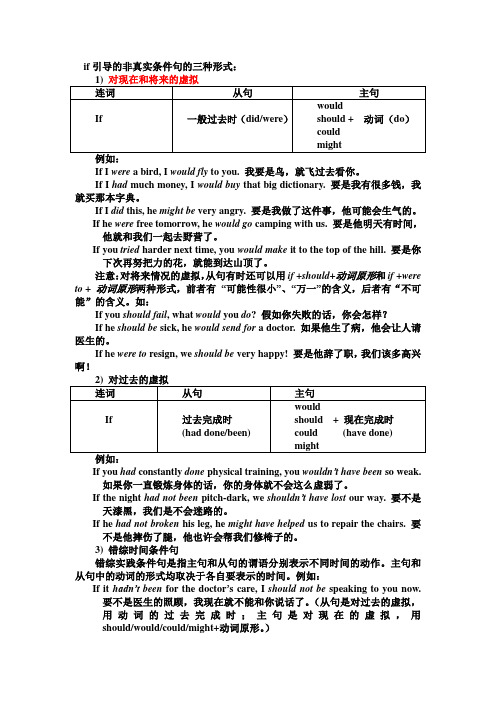
if 引导的非真实条件句的三种形式:If I were a bird, I would fly to you. 我要是鸟,就飞过去看你。
If I had much money, I would buy that big dictionary. 要是我有很多钱,我就买那本字典。
If I did this, he might be very angry. 要是我做了这件事,他可能会生气的。
If he were free tomorrow, he would go camping with us. 要是他明天有时间,他就和我们一起去野营了。
If you tried harder next time, you would make it to the top of the hill. 要是你下次再努把力的花,就能到达山顶了。
注意:对将来情况的虚拟,从句有时还可以用if +should+动词原形和if +were to + 动词原形两种形式,前者有 “可能性很小”、“万一”的含义,后者有“不可能”的含义。
如:If you should fail , what would you do ? 假如你失败的话,你会怎样?If he should be sick, he would send for a doctor. 如果他生了病,他会让人请医生的。
If he were to resign, we should bevery happy! 要是他辞了职,我们该多高兴啊!If you had constantly done physical training, you wouldn ’t have been so weak. 如果你一直锻炼身体的话,你的身体就不会这么虚弱了。
If the night had not been pitch-dark, we shouldn ’t have lost our way. 要不是天漆黑,我们是不会迷路的。
If 引导的虚拟语气
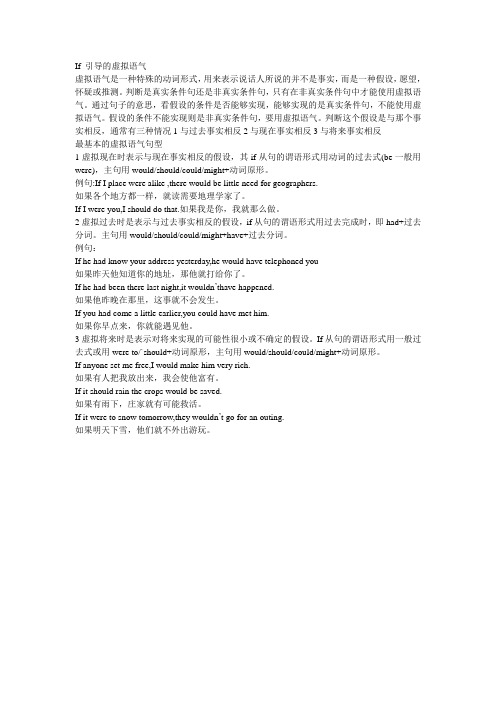
If 引导的虚拟语气虚拟语气是一种特殊的动词形式,用来表示说话人所说的并不是事实,而是一种假设,愿望,怀疑或推测。
判断是真实条件句还是非真实条件句,只有在非真实条件句中才能使用虚拟语气。
通过句子的意思,看假设的条件是否能够实现,能够实现的是真实条件句,不能使用虚拟语气。
假设的条件不能实现则是非真实条件句,要用虚拟语气。
判断这个假设是与那个事实相反,通常有三种情况1与过去事实相反2与现在事实相反3与将来事实相反最基本的虚拟语气句型1虚拟现在时表示与现在事实相反的假设,其if从句的谓语形式用动词的过去式(be一般用were),主句用would/should/could/might+动词原形。
例句:If I place were alike ,there would be little need for geographers.如果各个地方都一样,就读需要地理学家了。
If I were you,I should do that.如果我是你,我就那么做。
2虚拟过去时是表示与过去事实相反的假设,if从句的谓语形式用过去完成时,即had+过去分词。
主句用would/should/could/might+have+过去分词。
例句:If he had know your address yesterday,he would have telephoned you如果昨天他知道你的地址,那他就打给你了。
If he had been there last night,it wouldn’thave happened.如果他昨晚在那里,这事就不会发生。
If you had come a little earlier,you could have met him.如果你早点来,你就能遇见他。
3虚拟将来时是表示对将来实现的可能性很小或不确定的假设。
If从句的谓语形式用一般过去式或用were to/`should+动词原形,主句用would/should/could/might+动词原形。
if-引导的非真实性条件状语从句-即-虚拟语气
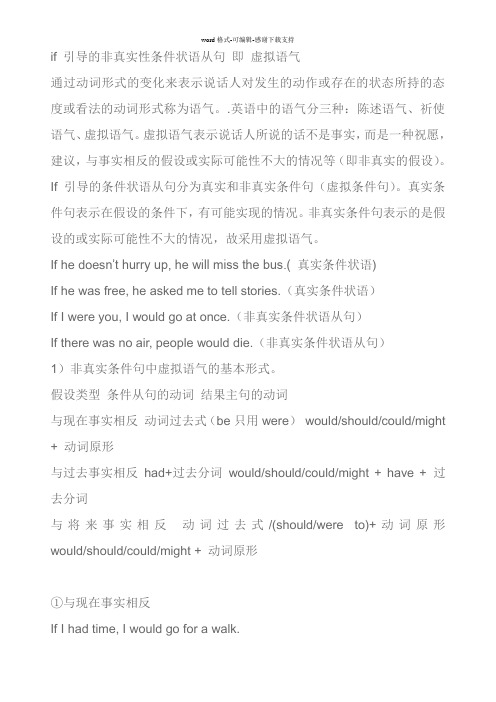
if 引导的非真实性条件状语从句即虚拟语气通过动词形式的变化来表示说话人对发生的动作或存在的状态所持的态度或看法的动词形式称为语气。
.英语中的语气分三种:陈述语气、祈使语气、虚拟语气。
虚拟语气表示说话人所说的话不是事实,而是一种祝愿,建议,与事实相反的假设或实际可能性不大的情况等(即非真实的假设)。
If 引导的条件状语从句分为真实和非真实条件句(虚拟条件句)。
真实条件句表示在假设的条件下,有可能实现的情况。
非真实条件句表示的是假设的或实际可能性不大的情况,故采用虚拟语气。
If he does n’t hurry up, he will miss the bus.( 真实条件状语)If he was free, he asked me to tell stories.(真实条件状语)If I were you, I would go at once.(非真实条件状语从句)If there was no air, people would die.(非真实条件状语从句)1)非真实条件句中虚拟语气的基本形式。
假设类型条件从句的动词结果主句的动词与现在事实相反动词过去式(be只用were)would/should/could/might + 动词原形与过去事实相反had+过去分词would/should/could/might + have + 过去分词与将来事实相反动词过去式/(should/were to)+动词原形would/should/could/might + 动词原形①与现在事实相反If I had time, I would go for a walk.如果我有时间,我就会去散步。
(实际情况:我现在没有时间,也不会去散步。
)If I were you, I would take an umbrella.假如我是你的话,我会带上雨伞。
(事实上我不可能是你。
)I would say no if someone asked me to be in a movie.假如有人请我当电影演员,我会表示拒绝。
if引导的条件句中的虚拟语气
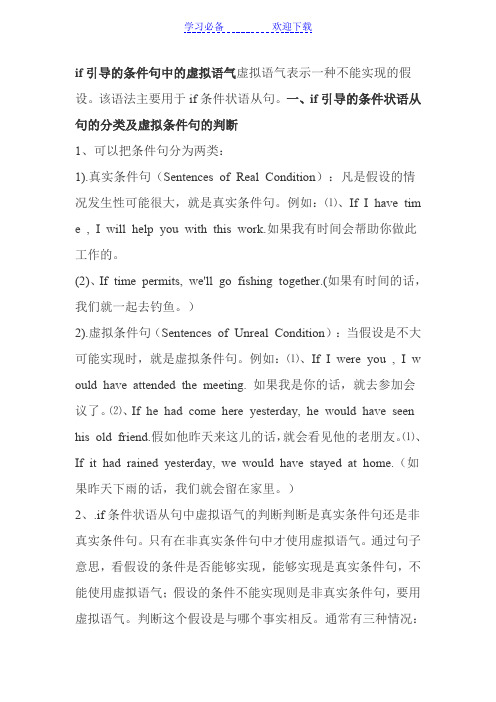
if引导的条件句中的虚拟语气虚拟语气表示一种不能实现的假设。
该语法主要用于if条件状语从句。
一、if引导的条件状语从句的分类及虚拟条件句的判断1、可以把条件句分为两类:1).真实条件句(Sentences of Real Condition):凡是假设的情况发生性可能很大,就是真实条件句。
例如:⑴、If I have tim e , I will help you with this work.如果我有时间会帮助你做此工作的。
(2)、If time permits, we'll go fishing together.(如果有时间的话,我们就一起去钓鱼。
)2).虚拟条件句(Sentences of Unreal Condition):当假设是不大可能实现时,就是虚拟条件句。
例如:⑴、If I were you , I w ould have attended the meeting. 如果我是你的话,就去参加会议了。
⑵、If he had come here yesterday, he would have seen his old friend.假如他昨天来这儿的话,就会看见他的老朋友。
⑴、If it had rained yesterday, we would have stayed at home.(如果昨天下雨的话,我们就会留在家里。
)2、.if条件状语从句中虚拟语气的判断判断是真实条件句还是非真实条件句。
只有在非真实条件句中才使用虚拟语气。
通过句子意思,看假设的条件是否能够实现,能够实现是真实条件句,不能使用虚拟语气;假设的条件不能实现则是非真实条件句,要用虚拟语气。
判断这个假设是与哪个事实相反。
通常有三种情况:①与过去事实相反。
②与现在事实相反。
③与将来事实可能相反。
3、“后退一步法”后退一步法是指在准确地判断了该句与哪一事实相反后,按虚拟语气的后退一步法处理从句谓语动词的时态。
if引导虚拟语气条件句PPT课件

06
总结与回顾
回顾if引导虚拟语气条件句的用法
虚拟语气在条件句中的用法
在条件句中,使用虚拟语气表示与实际情况相反的情况,或者表 示假设、猜测等。
虚拟语气的形式
虚拟语气有多种形式,包括与现在事实相反、与过去事实相反、与 将来事实相反等。
虚拟语气的时态
虚拟语气与时态有关,需要根据实际情况选择适当的时态。
况,主句用would+have+过 去分词的形式。
翻译题
01
02
03
中文
如果我知道这个消息,我 早就告诉你了。
英文
If I had known the news, I would have told you long ago.
解释
从句表示与过去事实相反 的情况,主句用 would+have+过去分词 的形式。
题目
If he _______ the money, he _______ able to buy a car.
had had; would be
答案
解释
从句表示与过去事实相反的情况,主句用would+______ rained last night,
the ground would be wet this morning.
表示与事实相反的情况
总结词
与事实相反的情况是指条件句中的假设与现实情况相 反,主句使用虚拟语气表示与实际情况的差异。
详细描述
在英语中,当if引导的条件句表示与事实相反的情况时, 主句通常使用虚拟语气。这种用法常用于表示某种假设 的情况并未实现,而是与现实情况相反。例如,“If I were you, I would not make that mistake again.” (如果我是你,我不会再犯那个错误了。)这句话表示 的是假设自己是对方,但实际上并不是,提醒对方不要 犯同样的错误。
虚拟语气
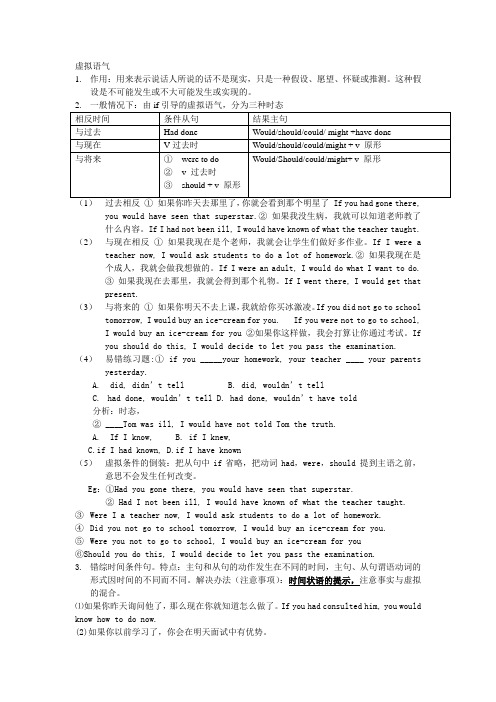
虚拟语气1.作用:用来表示说话人所说的话不是现实,只是一种假设、愿望、怀疑或推测。
这种假设是不可能发生或不大可能发生或实现的。
(1)过去相反①如果你昨天去那里了,你就会看到那个明星了 If you had gone there, you would have seen that superstar.②如果我没生病,我就可以知道老师教了什么内容。
If I had not been ill, I would have known of what the teacher taught.(2)与现在相反①如果我现在是个老师,我就会让学生们做好多作业。
If I were a teacher now, I would ask students to do a lot of homework.②如果我现在是个成人,我就会做我想做的。
If I were an adult, I would do what I want to do.③如果我现在去那里,我就会得到那个礼物。
If I went there, I would get thatpresent.(3)与将来的①如果你明天不去上课,我就给你买冰激凌。
If you did not go to school tomorrow, I would buy an ice-cream for you. If you were not to go to school,I would buy an ice-cream for you ②如果你这样做,我会打算让你通过考试。
Ifyou should do this, I would decide to let you pass the examination.(4)易错练习题:① if you _____your homework, your teacher ____ your parents yesterday.A.did, didn’t tellB. did, wouldn’t tellC.had done, wouldn’t tellD. had done, wouldn’t have told分析:时态,② ____Tom was ill, I would have not told Tom the truth.A.If I know,B. if I knew,C.if I had known,D.if I have known(5)虚拟条件的倒装:把从句中if省略,把动词had,were,should 提到主语之前,意思不会发生任何改变。
if引导的条件句 与 虚拟语气 的 区别

if引导的条件句与虚拟语气的区别if引导的从句什么时候用虚拟语气最佳答案if引导的条件状语从句的分类及虚拟条件句的判断1、可以把条件句分为两类:1).真实条件句(Sentences of Real Condition):凡是假设的情况发生性可能很大,就是真实条件句。
例如:⑴、If I have time , I will help you with this work.如果我有时间会帮助你做此工作的。
⑵、As long as I say anything wrong, you must point it out.只要我说了什么错话,你一定要指出来。
⑶、If time permits, we'll go fishing together.(如果有时间的话,我们就一起去钓鱼。
)2).虚拟条件句(Sentences of Unreal Condition):当假设是不大可能实现时,就是虚拟条件句。
例如:⑴、If I were you , I would have attended the meeting. 如果我是你的话,就去参加会议了。
⑵、If he had come here yesterday, he would have seen his old friend.假如他昨天来这儿的话,就会看见他的老朋友。
⑴、If it had rained yesterday, we would have stayed at home.(如果昨天下雨的话,我们就会留在家里。
)2、.if条件状语从句中虚拟语气的判断判断是真实条件句还是非真实条件句。
只有在非真实条件句中才使用虚拟语气。
通过句子意思,看假设的条件是否能够实现,能够实现是真实条件句,不能使用虚拟语气;假设的条件不能实现则是非真实条件句,要用虚拟语气。
判断这个假设是与哪个事实相反。
通常有三种情况:①与过去事实相反。
②与现在事实相反。
③与将来事实可能相反。
if引导虚拟语气的用法
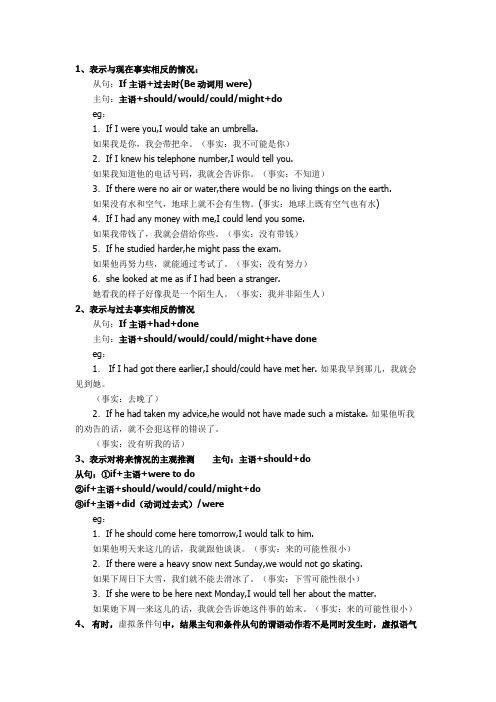
1、表示与现在事实相反的情况:从句:If 主语+过去时(Be动词用were)主句:主语+should/would/could/might+doeg:1.If I were you,I would take an umbrella.如果我是你,我会带把伞。
(事实:我不可能是你)2.If I knew his telephone number,I would tell you.如果我知道他的电话号码,我就会告诉你。
(事实:不知道)3.If there were no air or water,there would be no living things on the earth.如果没有水和空气,地球上就不会有生物。
(事实:地球上既有空气也有水)4.If I had any money with me,I could lend you some.如果我带钱了,我就会借给你些。
(事实:没有带钱)5.If he studied harder,he might pass the exam.如果他再努力些,就能通过考试了。
(事实:没有努力)6.she looked at me as if I had been a stranger.她看我的样子好像我是一个陌生人。
(事实:我并非陌生人)2、表示与过去事实相反的情况从句:If 主语+had+done主句:主语+should/would/could/might+have doneeg:1. If I had got there earlier,I should/could have met her. 如果我早到那儿,我就会见到她。
(事实:去晚了)2.If he had taken my advice,he would not have made such a mistake. 如果他听我的劝告的话,就不会犯这样的错误了。
(事实:没有听我的话)3、表示对将来情况的主观推测主句:主语+should+do从句:①if+主语+were to do②if+主语+should/would/could/might+do③if+主语+did(动词过去式)/wereeg:1.If he should come here tomorrow,I would talk to him.如果他明天来这儿的话,我就跟他谈谈。
语法突破讲义—if 引导的虚拟语气(补充)
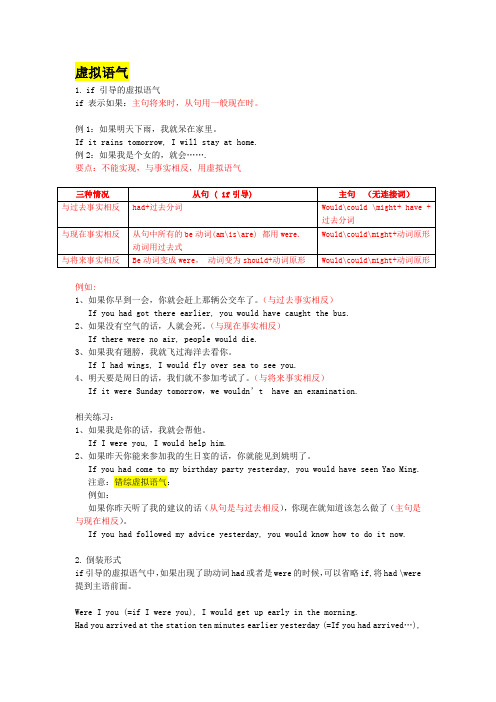
虚拟语气1.if 引导的虚拟语气if 表示如果:主句将来时,从句用一般现在时。
例1:如果明天下雨,我就呆在家里。
If it rains tomorrow, I will stay at home.例2:如果我是个女的,就会…….要点:不能实现,与事实相反,用虚拟语气例如:1、如果你早到一会,你就会赶上那辆公交车了。
(与过去事实相反)If you had got there earlier, you would have caught the bus.2、如果没有空气的话,人就会死。
(与现在事实相反)If there were no air, people would die.3、如果我有翅膀,我就飞过海洋去看你。
If I had wings, I would fly over sea to see you.4、明天要是周日的话,我们就不参加考试了。
(与将来事实相反)If it were Sunday tomorrow,we wouldn’t have an examination.相关练习:1、如果我是你的话,我就会帮他。
If I were you, I would help him.2、如果昨天你能来参加我的生日宴的话,你就能见到姚明了。
If you had come to my birthday party yesterday, you would have seen Yao Ming.注意:错综虚拟语气:例如:如果你昨天听了我的建议的话(从句是与过去相反),你现在就知道该怎么做了(主句是与现在相反)。
If you had followed my advice yesterday, you would know how to do it now.2.倒装形式if引导的虚拟语气中,如果出现了助动词had或者是were的时候,可以省略if,将had \were 提到主语前面。
Were I you (=if I were you), I would get up early in the morning.Had you arrived at the station ten minutes earlier yesterday (=If you had arrived…),you could have caught the train.Should it rain (=If it should rain), the crops would be saved.。
if虚拟语气的否定形式
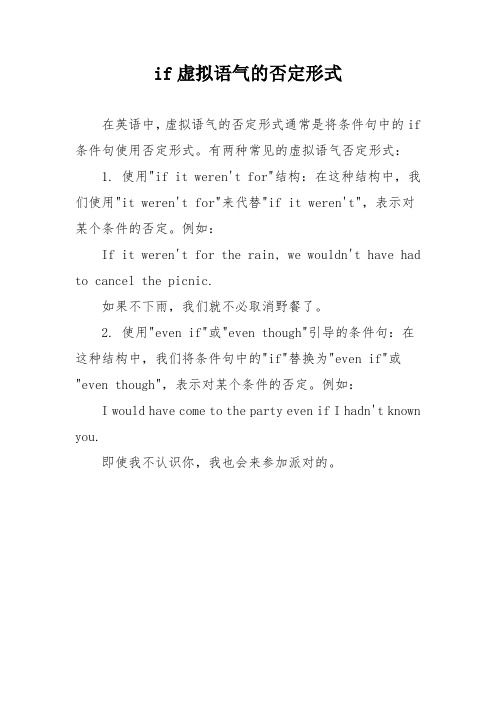
if虚拟语气的否定形式
在英语中,虚拟语气的否定形式通常是将条件句中的if 条件句使用否定形式。
有两种常见的虚拟语气否定形式:
1. 使用"if it weren't for"结构:在这种结构中,我们使用"it weren't for"来代替"if it weren't",表示对某个条件的否定。
例如:
If it weren't for the rain, we wouldn't have had to cancel the picnic.
如果不下雨,我们就不必取消野餐了。
2. 使用"even if"或"even though"引导的条件句:在这种结构中,我们将条件句中的"if"替换为"even if"或"even though",表示对某个条件的否定。
例如:
I would have come to the party even if I hadn't known you.
即使我不认识你,我也会来参加派对的。
if条件状语从句中虚拟语气
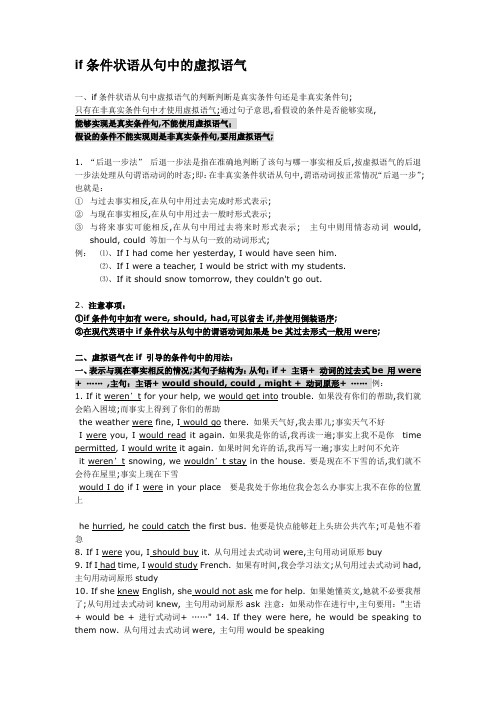
if条件状语从句中的虚拟语气一、if条件状语从句中虚拟语气的判断判断是真实条件句还是非真实条件句;只有在非真实条件句中才使用虚拟语气;通过句子意思,看假设的条件是否能够实现,能够实现是真实条件句,不能使用虚拟语气;假设的条件不能实现则是非真实条件句,要用虚拟语气;1. “后退一步法”后退一步法是指在准确地判断了该句与哪一事实相反后,按虚拟语气的后退一步法处理从句谓语动词的时态;即:在非真实条件状语从句中,谓语动词按正常情况“后退一步”;也就是:①与过去事实相反,在从句中用过去完成时形式表示;②与现在事实相反,在从句中用过去一般时形式表示;③与将来事实可能相反,在从句中用过去将来时形式表示;主句中则用情态动词would,should, could 等加一个与从句一致的动词形式;例:⑴、If I had come her yesterday, I would have seen him.⑵、If I were a teacher, I would be strict with my students.⑶、If it should snow tomorrow, they couldn't go out.2、注意事项:①if条件句中如有were, should, had,可以省去if,并使用倒装语序;②在现代英语中if条件状与从句中的谓语动词如果是be其过去形式一般用were;二、虚拟语气在if 引导的条件句中的用法:1. If it weren’t for your help, we would get into trouble. 如果没有你们的帮助,我们就会陷入困境;而事实上得到了你们的帮助the weather were fine, I would go there. 如果天气好,我去那儿;事实天气不好I were you, I would read it again. 如果我是你的话,我再读一遍;事实上我不是你time permitted, I would write it again. 如果时间允许的话,我再写一遍;事实上时间不允许it weren’t snowing, we wouldn’t stay in the house. 要是现在不下雪的话,我们就不会待在屋里;事实上现在下雪would I do if I were in your place要是我处于你地位我会怎么办事实上我不在你的位置上he hurried, he could catch the first bus. 他要是快点能够赶上头班公共汽车;可是他不着急8. If I were you, I should buy it. 从句用过去式动词were,主句用动词原形buy9. If I had time, I would study French. 如果有时间,我会学习法文;从句用过去式动词had,主句用动词原形study10. If she knew English, she would not ask me for help. 如果她懂英文,她就不必要我帮了;从句用过去式动词knew, 主句用动词原形ask 注意:如果动作在进行中,主句要用:"主语+ would be + 进行式动词+ ……" 14. If they were here, he would be speaking to them now. 从句用过去式动词were, 主句用would be speaking例如:⑴、If you had taken my advice, you would not have made such a mistake.如果你听了我的劝告,就不会犯这样的错误;事实上你没有听我的劝告⑵、I shouldn’t have been able to write such good novels if I hadn’t lived among the peasants for five years.如果我不是和农民生活了五年,就不可能写出这样好的小说;事实上我和农民生活了五年⑶、If you hadn’t invited me, I shouldn’t have come to the party.如果你不邀请我,我就不会来参加你的舞会;事实上你邀请了我⑷、If I hadn’t been ill yesterday, I might have come to school.昨天要是不生病,我是可能来上学的;事实上我生病了⑸、If he hadn’t broken the law, he wouldn’t have been put in prison.如果他不违法的话,就不会被打入监狱;事实上他违法了⑹、If I had been your headmaster, I should have dismissed you from school. 我要是你们校长的话,就把你开除学籍了;事实上我不是注意:如果动作在进行中,主句要用:"主语+ would + have + 完成进行式动词+……⑺、If they had been here, he would have been speaking to them.从句动词用had been, 主句动词用have been speaking⑴、I f I were to work at this problem, I would do it in another way.要是我来解这道难题,我会用另外一种方法的;⑵、I f you were to do such a thing again, you would be punished. 如果你再做这样的事情,就会受到惩罚;⑶、I f I should work harder, I could make much more progress.假如我更努力学习的话,我会取得更大的进步;事实上我不可能努力学习⑷、I f it should rain tomorrow, I would stay at home.如果明天下雨的话,我将待在家里;根据天气情况,明天不可能下雨⑸、I f he should come, I could ask him for some advice.万一他来了,我就能够向他请教;事实上他来的可能性很小⑹、I f he came tomorrow, I would do it with him.如果明天他来的话,我将和他一起做此事;事实上他来的可能性很小⑺、If it should rain, the crops would be saved.从句动词用should rain,主句动词用be 如果天下雨,庄稼可能就收获了;⑻、If he were here, I would give him the books.从句动词用were, 主句动词用give 如果他在这儿,我可能会把书给他;注意:如果动作在进行中,从句不是主句要用:"If + 主语+ 过去进行式动词+……"⑼、If she were staying here now, I would let her ride my horse.从句动词用were staying, 主句动词用let如果她现在留在这儿,我可能会让她骑我的马;。
if主将从现的用法与虚拟语气
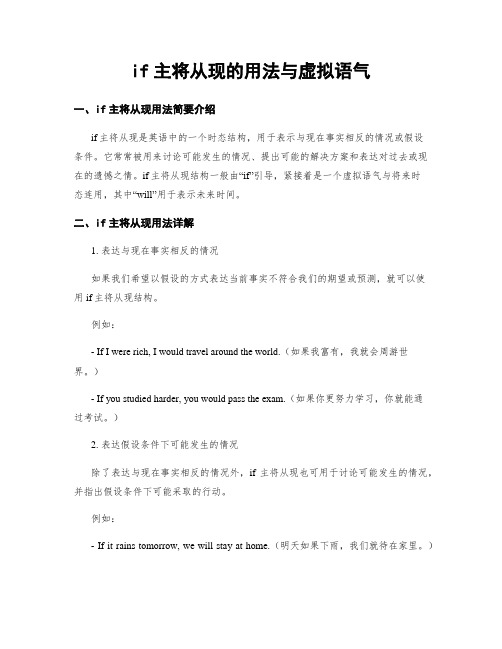
if主将从现的用法与虚拟语气一、if主将从现用法简要介绍if主将从现是英语中的一个时态结构,用于表示与现在事实相反的情况或假设条件。
它常常被用来讨论可能发生的情况、提出可能的解决方案和表达对过去或现在的遗憾之情。
if主将从现结构一般由“if”引导,紧接着是一个虚拟语气与将来时态连用,其中“will”用于表示未来时间。
二、if主将从现用法详解1. 表达与现在事实相反的情况如果我们希望以假设的方式表达当前事实不符合我们的期望或预测,就可以使用if主将从现结构。
例如:- If I were rich, I would travel around the world.(如果我富有,我就会周游世界。
)- If you studied harder, you would pass the exam.(如果你更努力学习,你就能通过考试。
)2. 表达假设条件下可能发生的情况除了表达与现在事实相反的情况外,if主将从现也可用于讨论可能发生的情况,并指出假设条件下可能采取的行动。
例如:- If it rains tomorrow, we will stay at home.(明天如果下雨,我们就待在家里。
)- If she calls me, I will tell her the news.(如果她打电话给我,我会告诉她这个消息。
)3. 表达对过去或现在的遗憾之情if主将从现也常常用来表达对过去或现在无法实现的愿望、打算或决定感到遗憾。
例如:- If I had known about the job opening, I would have applied for it.(如果我早知道那个工作机会,我会申请的。
)- If she hadn't missed the train, she would be here now.(如果她没有错过火车,她现在就会在这里了。
)三、if主将从现用法注意事项1. if主将从现结构中的动词形式不随人称和数变化。
if引导的虚拟语气的用法归纳
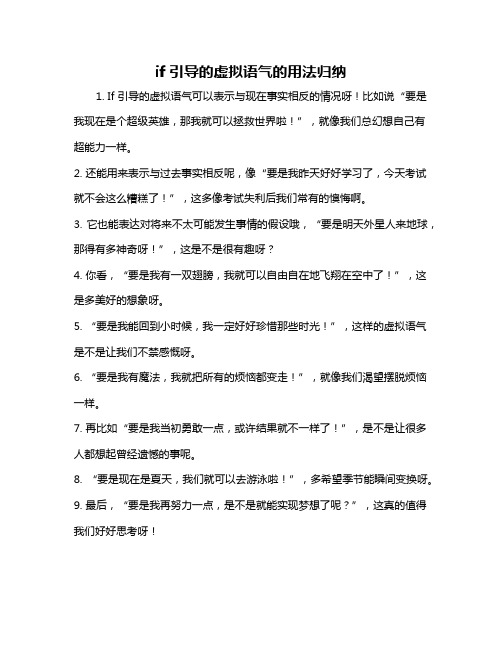
if引导的虚拟语气的用法归纳
1. If 引导的虚拟语气可以表示与现在事实相反的情况呀!比如说“要是我现在是个超级英雄,那我就可以拯救世界啦!”,就像我们总幻想自己有超能力一样。
2. 还能用来表示与过去事实相反呢,像“要是我昨天好好学习了,今天考试就不会这么糟糕了!”,这多像考试失利后我们常有的懊悔啊。
3. 它也能表达对将来不太可能发生事情的假设哦,“要是明天外星人来地球,那得有多神奇呀!”,这是不是很有趣呀?
4. 你看,“要是我有一双翅膀,我就可以自由自在地飞翔在空中了!”,这是多美好的想象呀。
5. “要是我能回到小时候,我一定好好珍惜那些时光!”,这样的虚拟语气是不是让我们不禁感慨呀。
6. “要是我有魔法,我就把所有的烦恼都变走!”,就像我们渴望摆脱烦恼一样。
7. 再比如“要是我当初勇敢一点,或许结果就不一样了!”,是不是让很多人都想起曾经遗憾的事呢。
8. “要是现在是夏天,我们就可以去游泳啦!”,多希望季节能瞬间变换呀。
9. 最后,“要是我再努力一点,是不是就能实现梦想了呢?”,这真的值得我们好好思考呀!
总之,if 引导的虚拟语气真的很神奇,能让我们想象各种不可能的事情,让我们的思维更加开阔呢!。
if条件状语从句中虚拟语气
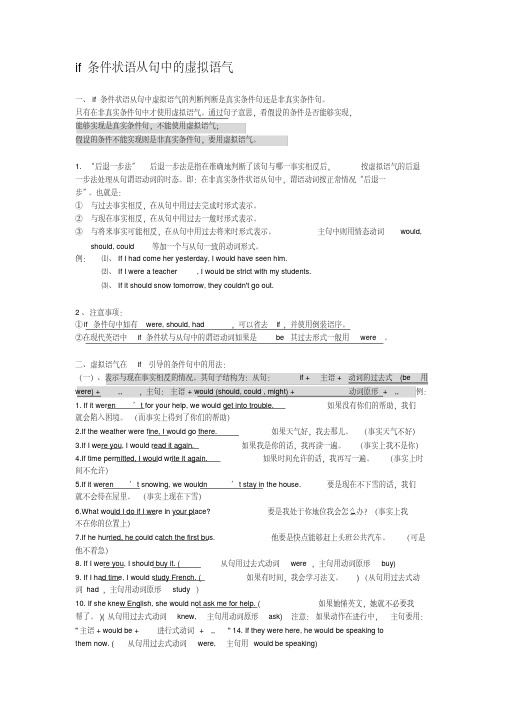
if条件状语从句中的虚拟语气一、if条件状语从句中虚拟语气的判断判断是真实条件句还是非真实条件句。
只有在非真实条件句中才使用虚拟语气。
通过句子意思,看假设的条件是否能够实现,能够实现是真实条件句,不能使用虚拟语气;假设的条件不能实现则是非真实条件句,要用虚拟语气。
1. “后退一步法”后退一步法是指在准确地判断了该句与哪一事实相反后,按虚拟语气的后退一步法处理从句谓语动词的时态。
即:在非真实条件状语从句中,谓语动词按正常情况“后退一步”。
也就是:①与过去事实相反,在从句中用过去完成时形式表示。
②与现在事实相反,在从句中用过去一般时形式表示。
③与将来事实可能相反,在从句中用过去将来时形式表示。
主句中则用情态动词would,should, could 等加一个与从句一致的动词形式。
例:⑴、If I had come her yesterday, I would have seen him.⑵、If I were a teacher, I would be strict with my students.⑶、If it should snow tomorrow, they couldn't go out.2、注意事项:①if条件句中如有were, should, had,可以省去if,并使用倒装语序。
②在现代英语中if条件状与从句中的谓语动词如果是be其过去形式一般用were。
二、虚拟语气在if 引导的条件句中的用法:(一)、表示与现在事实相反的情况。
其句子结构为:从句:if + 主语+ 动词的过去式(be 用were) + ,,,主句:主语+ would (should, could , might) + 动词原形+ ,,例:1. If it weren’t for your help, we would get into trouble. 如果没有你们的帮助,我们就会陷入困境。
(而事实上得到了你们的帮助)2.If the weather were fine, I would go there. 如果天气好,我去那儿。
if引导条件状语从句虚拟语气

虚气是一法点,了学便于理解与,我把虚气分红三大来:1.名从句中的虚气2.条件从句中的虚气志 +should+ 原形①三种基本②倒装虚句③混虚句④委婉虚句⑤跳虚句3.其余情况中的虚气( wish/would rather/It ’s high time ⋯/If only ⋯/lest )一.三种基本形( 1)表虚的 if从句形式主句形式在: did / were would (should, might, could)+do去: had done/ had been would (should/might/could)+have done(been)未来: were to/ should+do would (should, might, could)+do三种基本形( 2)(是基,建牢下边的例句,争取能信口开河)与在事相反: If I had enough money, I would buy a book.与去事相反: If I had had enough money, I would have bought a book.与未来事相反: If I were to have enough money, I would buy a book.If I should have enough money, I would buy a book.二、倒装虚句(只好与去/ 未来事相反,省去if ,只有三种倒装形式)Had I had enough money, I would have bought a book.Were I to have enough money, I would buy a book.Should I have enough money, I would buy a book.三、混淆虚气(主假如抓住状)( 去事虚 +在事虚 )If I had studied English at school, I could read the English novel now.( 在事虚 +去事虚 )If she were not so careless, she wouldn’t have made such a mistake.四、委婉虚句(在四考中当前未出此考点,但在中常)3.虚气用在主从句中。
- 1、下载文档前请自行甄别文档内容的完整性,平台不提供额外的编辑、内容补充、找答案等附加服务。
- 2、"仅部分预览"的文档,不可在线预览部分如存在完整性等问题,可反馈申请退款(可完整预览的文档不适用该条件!)。
- 3、如文档侵犯您的权益,请联系客服反馈,我们会尽快为您处理(人工客服工作时间:9:00-18:30)。
4.1 Wish/ if only 的用法
用在“wish+宾语从句”中,表示很难实现或不能实现 的愿望,可以翻译为“但愿…”, “悔不该…”等。
① 表示对现在的虚拟,从句的谓语动词用过去式(be 动词用were);
② 表示对过去的假设,从句的谓语动词用 “had+过去 分词”
If they had not campagined for financial independence, women may not have had control over their own money.
与将来事实相反的假设
if条件句中的谓语动词
1. 行为动词用did 2. should + 动词原形 3. were to + 动词原形
主句的谓语动词
Should/would/could/might + 动词原形
1.
If the people were better educated, I believe this could solve the
problem.
If they had proper education in schools, they would know how to
假如她昨天邀请我参加聚会,我就去了。
If she should invite me tomorrow, I would go to the part
如果她明天邀请我参加聚会,我会去的。
• 后退一步法是指在准确地判断了该句与哪一事实相反后, if引导的非真实条件状语从句中,谓语动词按正常情况 “后退一步”。
② 表示与过去事实想法的假设
主语+ wish/ if only + that+ 1. 过去完成时 2. would/could/should+V +have done
• I wish that he had been my boyfriend at that time. • I wish that she could have helped me when I wan
• It was suggested that he attend the conference. • It was requested that the trial be openly reported.
4.7 用在表示建议、要求、命令等意思的形容词
在It’s important (imperative, necessary, essential, vital, desirable, advisable, better) that…句型中,that 引导的从句用虚拟语气, should可以省略。这个句型表示说话人的意见、要求等。
4.6 用在表示建议、要求、命令等意思的动词
主语+ 谓语动词+should + 动词原形,should 可以省略。这类的动词有: arrange/command/demand/desire/ insist/order/propose/request/require/suggest/beg/move(提议)
if引导的条件句
If she invites me tomorrow, I will go to the party.
请把这句话与下面虚拟语气的带条件从句的主从复合句进行比较:
If she invited me, I would go to the party.
假如她邀请我参加聚会,我就去。
If she had invited me yesterday, I would have gone to the party.
注意:wish 与hope接宾语从句的区别在于: hope表示一般可以实现的希望,宾语从句用陈述语气。 Wish表示很难或不大可能实现的愿望,宾语从句用虚拟语气。
请比较: • We hope we will succeed. (We don’t know if we will succeed.) • We wish we would succeed. (We know we can hardly
• She looks as if/though she were ill.看她的样子,好像生病了。 • He walks as if he were a king.他走起路来就好像他是国王。 • He acted as if nothing had happened.他表现得若无其事。 • He would not resign even if the heaven should collapse.即使天塌下来,
If you should fail, try again. →Should you fail, try again.
If you had been here earlier, you would have seen him. →Had you been here earlier, you would have seen him.
Note:suggest 表示“暗示,表明”时,宾语从句不用虚拟语 气。Insist后面强调的是事实时,宾语从句也不用虚拟语气。
Note: 若上述表示建议、要求、命令等意思的动词用作名词时, 名词之后的从句用虚拟语气,should 可以省略。如:
He made a request that he (should) be allowed to take 3 days off. Our suggestion is that education not be industrialized.
succeed.)
4.2 as if/as though, even if/even though从句中的虚拟.
① 如果指的是现在的状况,则用过去式(be用were) ② 如果指过去发生的动作,则谓语动词用had+过去分词形式 ③ 如果指将来的事情,would (should, could)+动词原形
他也不会辞职。
4.3在It is (high) time (that)…句型中
① 后面的从句的谓语动词常用过去式(be的过去式用were) ② 或用should+动词原形(should 不能省略)来表示。这句话的意
思是“(现在)该…”。
For example: • It is time we left/should leave. • It is high time that you got married. • It is time that I bought a car.
• We suggested that we (should) have a meeting. • We insisted that they (should) go with us. • The doctor ordered that she (should) stay in bed for a few days. • He demanded that we (should) start right away. • The villagers requested that the old building not be pulled down.
• 也就是: ①与过去事实相反,在从句中用过去完成时形式表示 ②与现在事实相反,在从句中用过去一般时形式表示 ③与将来事实可能相反,在从句中用过去将来时形式表示
• 主句中则用情态动词would, should, could 等加动词形式
1. 对现在的虚拟
if条件句中的谓语动词
1. 行为动词用过去形式 2. be动词用were
③ 表示对将来的愿望,从句的谓语动词用“would (could)+动词原形
① 表示与现在事实不相符的假设事件 1. V-ed
主语+ wish/ if only + that+ 2. were 3. would/could/should+V
• I wish that he were my boyfriend. • I wish that he cared for me. • I wish that he could help me when I an in trouble.
主句的Байду номын сангаас语动词
Should/would/could/might + 动词原形
1. If the lecture should be late, you should have to make a speech first. 2. If the lecture were late tomorrow, you would have to make a speech first.
• 虚拟语气中省略if:在书面语中,如果从句 的谓语中有were, had 或should, 就可以省略if, 并将were, had 或should 放到句首。当然, 如果从句没有were, had, 或should,就不能省 略if.
If I were to do it, I`d do it some other way. →Were I to do it, I’d do it some other way.
• Note:上述动词在It is suggested that…, It is required that…, It’s requested that…, It’s ordered that…, It’s arranged that…句型中, that 之后的从句用虚拟语气,should 可以省略,但引导词 that 不能省略。如:
control their lives.
2. 对过去的虚拟
if条件句中的谓语动词
Had done
主句的谓语动词
Should/would/could/might + have done
